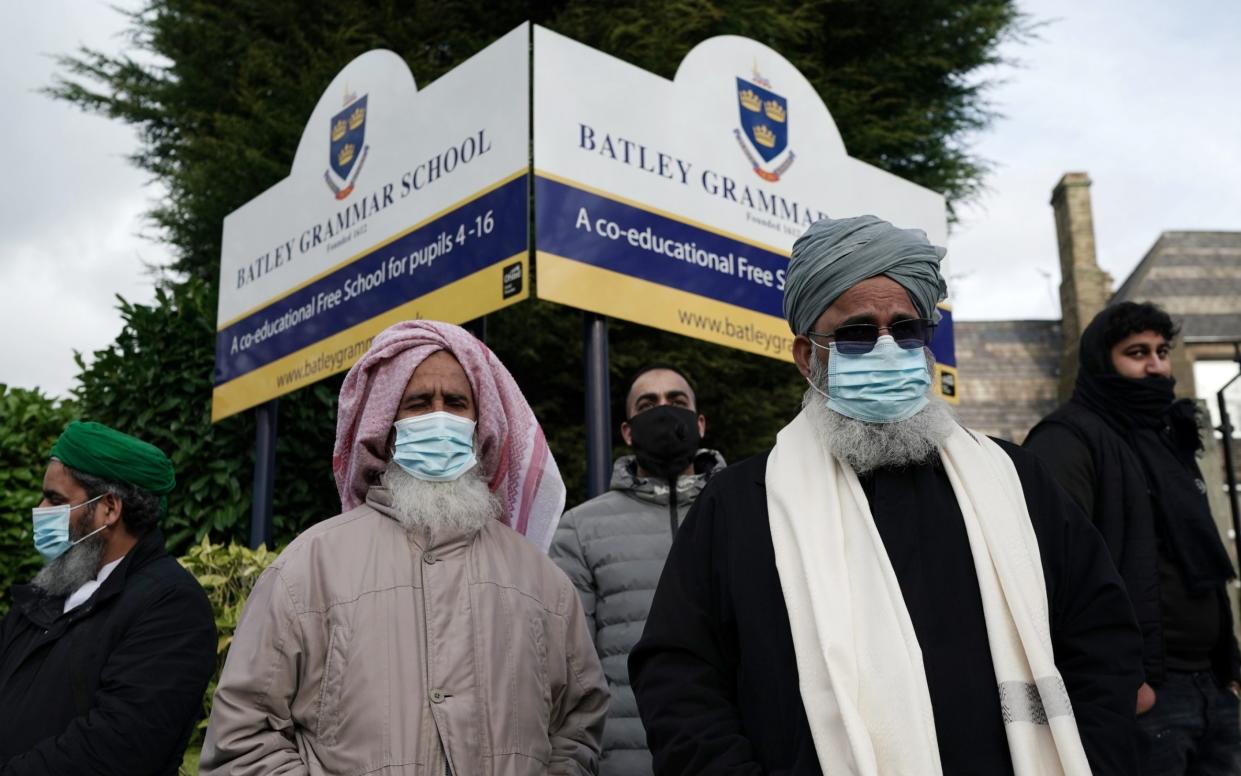Protests outside schools and cinemas by hardline Muslims 'pose national security threat'

Anti-blasphemy protests outside schools and cinemas by conservative Muslims are becoming a threat to national security, a new report has warned.
The review by the Henry Jackson Society think tank has warned that the failure to protect teachers and others from intimidation is amounting to a tacit anti-blasphemy law.
The 69-page report, Britain’s New Blasphemy Police?, examined a series of incidents in recent years including the case of a teacher at Batley Grammar School in West Yorkshire who showed pupils a cartoon of the Prophet Mohammed during an RE lesson.
The teacher remains in hiding more than two years after the row, which prompted protests at the school gates.
The report found that some of those involved in the protest had praised extreme religious clerics and said the school’s response of apologising set a “worrying precedent.”
“Non-religious schools should not be beholden to religious restrictions,” it noted.
Death threats
It also looked at an incident in Wakefield where a Koran was accidentally damaged in the playground prompting death threats against a 14-year-old autistic boy and his mother, who appeared at a local mosque to apologise.
The report said that that incorrect rumours spread by local politicians showed “problematic political influence over how blasphemy incidents are responded to” and it “is inappropriate for a religious institution to become involved in matters of an unrelated school”.
It recommended the government create an interdepartmental taskforce to investigate what happened in Batley and Wakefield.
On the wider issue, the report’s author, Charlotte Littlewood, a research fellow at the think tank, concluded that the backlash over offensive portrayals of Islam pose “a serious threat to social cohesion, individual liberties and the peaceful coexistence of diverse communities within the United Kingdom.
“The threat is perhaps not taken as seriously as Salafi-jihadist style terror, yet it is nonetheless one that has a potential to inspire intimidation, violence and even mass killings.”
Potential for violence
The report said that most cases fall within the law, but “they have the potential in some cases to develop into threatening and even violent action”.
It said that radical anti-blasphemy clerics from Pakistan and Bangladesh had entered the UK to preach at mosques linked to “extreme anti-blasphemy action in the UK”.
Ms Littlewood urged the Home Office to do more to block extremist preachers entering the UK in the same way as it has stopped far-right speakers.
In some instances, local councils are taking “contradictory and problematic positions” and the “responses of schools, publishing houses and cinemas have been inconsistent and potentially led by fear.”
It noted: “Accepting a tacit anti-blasphemy law is antithetical to our democratic values whilst also a threat to national security. Schools, cinemas and publishing houses need commitments to be made to their assured safety in the face of threats and renewed and robust guidelines on how to respond to threats of anti-blasphemy action.”
The report suggested the Home Office should proscribe two groups supported by some protestors that promote violence against marginalised Ahmadi Muslims.
Teaching without censorship
The Department for Education was also urged to prioritise the safety of staff and pupils and the ability to teach without censorship.
In a foreword to the report, Tim Loughton, a Conservative MP, said it showed “extreme anti-blasphemy action as a growing risk to key tenets of our liberal democratic system, including the right to freedom of speech and freedom of religion”.
He added: “UK publishing houses and cinemas have been intimidated and on occasion attacked on grounds of blasphemy. A teacher remains in hiding, an autistic boy received death threats and all the while schools, local authorities and even the police have seemingly cooperated with protesters. This simply cannot continue.
“It is time to afford extreme anti-blasphemy action the same attention we afford the likes of Al-Qaeda and ISIS. If the attacks on the Charlie Hebdo offices in France are anything to go by, this ideological extremism has no lesser propensity for violence. “
A Home Office spokesperson said: “Extremism has no place in our society. We work closely with law enforcement, local communities and our international partners to tackle groups and individuals who sow division and hatred.”
A Department for Education spokesperson said: “We have been clear that it is never acceptable to threaten or intimidate teachers and we encourage dialogue between parents and schools when issues emerge.
“Schools are free to include a full range of issues, ideas and materials in their curriculum, including where they are challenging or controversial subject to their obligations to ensure political balance. However, they must balance this with the need to promote respect and tolerance between people of different faiths and beliefs, including in deciding which materials to use in the classroom.”

